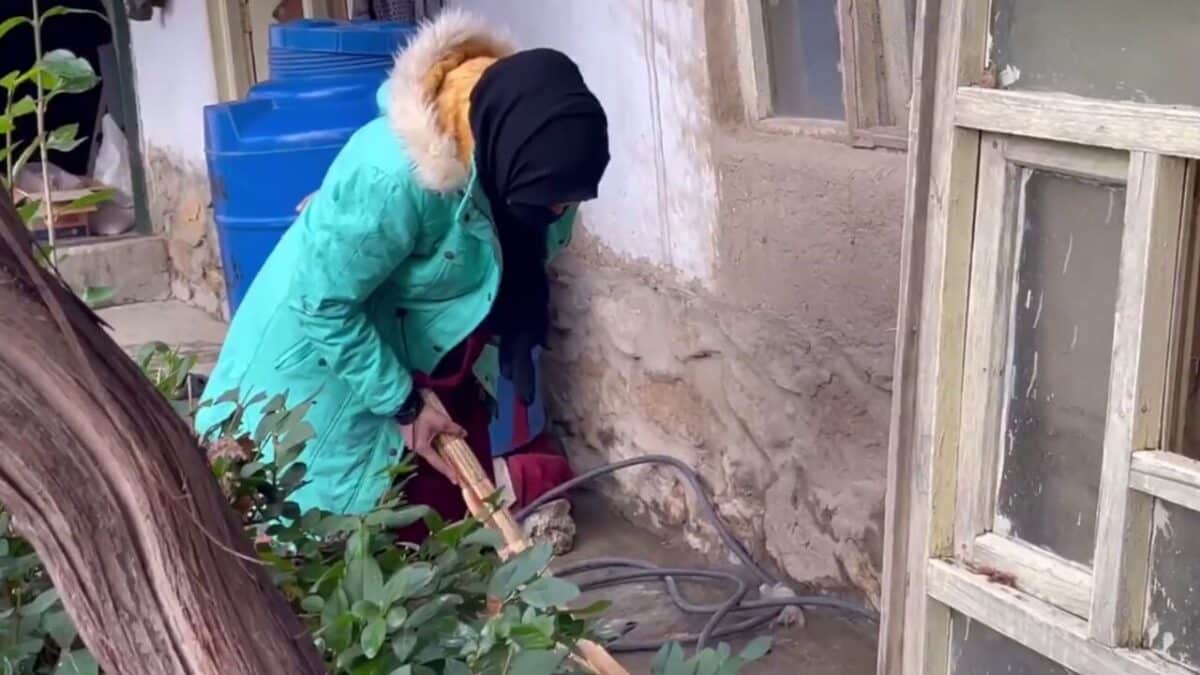
‘A path of hardship and despair’: Afghan migrant recounts perils of irregular migration
روایت یک قربانی مهاجرت غیرقانونی از دشواریهای این مسیر
در ادامه روایتها از مسیر مهاجرتهای غیرقانونی؛ یکی از قربانیان مهاجرتهای غیرقانونی با نام مستعار ستاره از دشواریهای موجود در اردوگاههای شبکههای قاچاق انسان میگوید.
این قربانی که با آمو گفتوگو کرده است، روزها را در این مسیر گرسنه سپری کرده و در ادامه مسیر مهاجرت غیرقانونی ناگزیر شده که برای چندین ساعت با پای پیاده از مسیرهای کوهستانی و دشوارگذر عبور کند. او از دشواریهای بیشتر مسیر در این گزارش روایت کرده و از دیگران نیز خواسته که به مسیر مهاجرت غیرقانونی نروند.
مهاجرتهای غیرقانونی و دشواریهای این مسیر، روایتهای ناگفته شده و یا کمتر گفته شده قربانیان این مسیر.
او با همسراش و دیگر عضوهای خانواده، اقدام به مهاجرت غیرقانونی کرد. ستاره و خانوادهاش به مقصد ایران مهاجرت کردند.
ستاره و خانوادهاش نخست به نیمروز انتقال داده شدند و دو روز را با دشواری در یکی از اردوگاههای شبکههای قاچاق انسان سپری کردند.
او گفت: «دو روز در ولایت نیمروز باقی ماندیم. نه نان بود، نه آب بود؛ نهجای بودوباش. هیچ امکاناتی آنجا وجود نداشت، بعد بهطرف پاکستان حرکت کردیم.»
از نیمروز مقصد بعدی برای ستاره و خانوادهاش، پاکستان گفته شد. ستاره تاکید دارد که با گذشت هر ساعت، دشواریهای مسیر سنگینتر و پیچیدهتر میشد.
ستاره افزود: «در مسیر راه پاکستان ما خیلی دشواریها را کشیدیم، در یک موتر ۱۵ تن را جابهجا کردند، بسیار شرایط سخت بود، حالت دشوار، هوا بهحدی گرم بود که موها و پوست سر من دچار شاریدگی شده بود.»
یکی از بخشهای مسیر بهگفته ستاره عبور از بلندیهای بخشهای کوهستانی بود که باید ساعتها پیاده این مسیر طی میشد و با خطر افتادن از بلندی بود.
ستاره میگوید: «در پاکستان انبوه مردم بود، فکر میکردی، تمام افغانستان ایران میروند، مردم در شرایط سخت و ناخوش و بد بهسر میبردند. دشواری در این منطقه بهحدی بود که مردم همه وسایل خود را دور میانداختند، چون انتقال نمیتوانستند. فقط یک لباس با یک بکس را با خود میگرفتند، در مسیر که پیاده میرفتیم، که بلند و کوه بود، حتا پای تان لغزش پیدا میکرد، حتا بهحدی بود، فردی میافتاد، زنده نمیماند.»
ستاره میگوید، گرسنگی و تشنگی به پیچیدگی و دشواری مسیر بیشتر از بیش میفزود، اما آنچه برایش تکاندهنده تمام شده وضعیت بودوباش در اردوگاههای شبکههای قاچاق انسان بوده، که در آن مهاجران بهگفته او، بههیچ خدمات مورد نیاز دسترسی ندارند.
ستاره میافزاید:«ما بیشتر از ۱۲ ساعت پیاده روی کردیم و حتا پاهای ما آبله کرده بود که راه رفتن برای ما سخت شده بود. حداقل برای خودم، آب نبود، غذا هیچ نبود، اگر پیدا هم میشد؛ نانهای خشک شده که قابل خوردن نبود.
بسیار بهسختی و جنجال ما تا اردوگاههای که میرفتیم، در اردوگاههای که ما میرفتیم، اصلا انسان آنجا زندگی نمی توانست ولی ما را میبردند، بعد قاچاقچیان تبدیل میشدند، و ما را دست به دست می ساختند، تا بهمقصد برسیم.»
ستاره تاکید دارد، که هرچند دهها چالش و دشواری را تجربه کردند، تا اینکه به ایران برسند و شاید زندگی بهتر با امکانات خوب در انتظار آنان باشند؛ اما دشواریها در ایران هم برای مهاجران غیرقانونی کمتر نبوده، از وضعیت بد شغلی تا چالش محل بودوباش.
ستاره میگوید: «در کار و وظیفه اصلا افغانیها را نمیگرفتند، میگفتند به ما اجازه داده نشده که افغانیها را بگیرید، بسیار زیاد وضعیت بد بود. خانه نداشتیم، جای بودوباش نبود. حتا شبها را در جادهها سپری کردیم، بهخاطری که جای بودوباش نداشتیم.»
سرانجام بهدلیل اینکه، همسر ستاره از سوی پولیس ایران بازگشت اجباری داده میشود؛ ستاره نیز ناگزیر میشود به افغانستان باز گردد؛ او مسیر مهاجرت غیرقانونی را یک مسیر «دشوار و ناپسند» عنوان میدهد، از دیگران نیز انتظار دارد تا این مسیر را انتخاب نکنند.
ستاره به آمو گفت:«پیام من بر کسانیکه غیرقانونی میخواهند از افغانستان بیرون شوند، هیچ وقت همچون تجربه را انجام ندهند، تجربه نکنند، شرایط راه و مسیر بسیار دشوار است، حتا به اندازه است که پاسبانهای که در مرزها است افراد را ازبین میبرند. به اینها قاچاقبران میگویند شما با شتاب حرکت کنید که از دست اینها نجات پیدا کنید، آنها هم مستقیم بالای شان فیر میکنند و آنها را از بین میبرند.»
سالها میشود، بهگفته قربانیان مهاجرت غیرقانونی، «فقر اقتصادی، بیکاری، تحولهای سیاسی» برخی مردم افغانستان را در مسیرهای مهاجرت غیرقانونی دنبال یک زندگی بهتر و لقمه نانی سرگردان ساخته؛ اما تهدیدها و چالشها در این مسیر هزاران روایت را رقم زده که هر کدام «درد و ناگزیریهای» خود را دارد.
KABUL, Afghanistan — For Setara, a pseudonym she chose to protect her identity, the dream of a better life led her down a perilous path. Alongside her husband and family, she embarked on an irregular migration journey from Afghanistan to Iran, one fraught with hunger, exhaustion, and inhumane conditions in human smuggling camps.
Speaking anonymously due to security concerns, Setara shared her story of survival, urging others to avoid what she called a “path of hardship and despair.”
A journey begins in desperation
Setara’s journey started in Nimroz Province, a notorious hub for human trafficking networks. The family endured two days in a smuggling camp that she described as lacking even the most basic necessities.
“There was no food, no water, and no place to stay,” Setara said. “The conditions were unbearable. After two days, we were told to move toward Pakistan.”
The journey quickly became more grueling as they approached the border. Smugglers crammed 15 people into vehicles designed for far fewer passengers, exposing them to extreme heat and discomfort.
“The heat was so intense that my scalp and hair were damaged,” Setara recounted. “Every hour, the difficulties became heavier and more complicated.”
Treacherous mountain crossings
One of the most harrowing parts of the journey was crossing mountainous terrain on foot, a trek that lasted hours and carried the constant risk of fatal falls.
“The mountain paths were so steep and dangerous that if you slipped, you wouldn’t survive,” Setara said. “People had to discard their belongings because carrying anything extra was impossible. All we could manage was a small bag and the clothes we were wearing.”
Setara described the scene in Pakistan as chaotic. “It felt like all of Afghanistan was heading to Iran,” she said. “People were in terrible conditions, throwing away their belongings because they couldn’t carry them any longer.”
Inhumane conditions in smuggling camps
The lack of food and water compounded the physical and emotional toll of the journey, but Setara found the conditions in smuggling camps particularly appalling.
“We walked for over 12 hours, and our feet were covered in blisters,” she said. “The camps we were taken to were uninhabitable—places where no human being should ever live. We had no food, and if any was available, it was dry bread that was barely edible.”
The smugglers treated migrants as commodities, passing them from one group to another. “We were handed off like goods, moving from one smuggler to the next until we reached our destination,” she said.
A harsh reality in Iran
Setara and her family eventually reached Iran, but the challenges did not end there. As undocumented migrants, they faced significant discrimination and harsh living conditions.
“There were no jobs for Afghans,” Setara said. “Employers told us they weren’t allowed to hire Afghans. We had no home and often spent nights on the streets because we had nowhere else to go.”
The situation worsened when Iranian authorities detained her husband and forcibly deported him back to Afghanistan. With no other options, Setara returned to Afghanistan as well, disillusioned by the journey and its aftermath.
Reflecting on her experience, Setara described irregular migration as a dangerous and dehumanizing process. She urged others not to follow the same path.
“My message to anyone thinking about leaving Afghanistan illegally is simple: Don’t do it,” she said. “The journey is too dangerous. Smugglers push people to move quickly to avoid detection by border guards, but those guards often shoot directly at migrants, killing many.”
Economic hardship, unemployment, and political instability have driven countless Afghans to embark on irregular migration routes in search of a better life. Yet, for many, the journey leads to suffering, exploitation, and tragedy.
The testimonies of survivors like Setara reveal the stark realities of these dangerous routes, from physical abuse and life-threatening conditions to the emotional toll of displacement and uncertainty. Her story is one of many, each marked by pain, resilience, and the hope for a future beyond poverty and insecurity.
Source
- Tags
- Oceania



